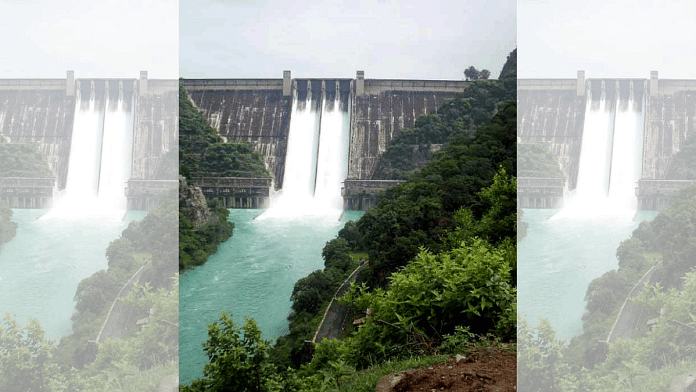Shimla: At a time when the state is facing an acute financial crunch, the Himachal Pradesh High Court Tuesday set aside the Sukhvinder Singh Sukhu government’s decision to impose water cess on hydropower generation, calling it “unconstitutional”.
The Congress government had estimated revenues to the tune of Rs 1,800 crore from power players. Some of the private hydro power players have already deposited Rs 33 crore as cess.
One of the petitioners was represented by senior advocate Abhishek Manu Singhvi, who had unsuccessfully contested the Rajya Sabha election from the hill state.
The petitioners submitted that the state lacks the legislative competence to levy tax/cess on water use for the generation of hydro electricity since the said levy directly relates to the power generated and transferred outside the State.
“The provisions of the Himachal Pradesh Water Cess on Hydropower Electricity Generation Act, 2023, are declared to be beyond the legislative competence of the State Government in terms of Articles 246 and 265 of the Constitution and, thus, ultra vires the Constitution,” a division bench of Justices Tarlok Chauhan and Satyen Vaidya ruled.
“Consequently, the Himachal Pradesh Water Cess on Hydropower Electricity Generation Rules, 2023, are also quashed and set aside.”
The Himachal Pradesh Water Cess on Hydropower Generation Bill was introduced in the assembly on 14 March last year and passed on 16 March.
In the high court, the Himachal government defended its decision saying that the state government is competent to legislate charges on usage of water from natural resources situated within its territory.
It further contended that the cess does not create any dispute with regard to interstate rivers water. “The water being in and over the land, the income/revenue generated from water is the land revenue of the state,” it said.
But the HC observed that it was evident from the notification that the state has calibrated the cess keeping in view potentiality of the water, i.e. the greater the height from which the water falls on turbine, the more the power generation.
“Therefore, it is not essentially the quantum of water but rather it is the head-height, which has been taken into consideration by the State while fixing the rate of levy,” the judgment reads.
“In other words, the power to tax is on generation of electricity, and user of water is only incidental. The ‘user of water’ is not being taxed and it is only the ‘user of water for generation of electricity’, who is being taxed. Therefore, it is a tax on generation of electricity. If it was the quantum of water used, then the height from which the water would fall as a measure to determine the rate of cess would be wholly irrelevant.”
Himachal Pradesh chief secretary Prabodh Saxena indicated that the state government could legally contest the decision. “The decision was taken to generate revenue. We will examine the judgment and decide the further course of action,” Saxena told ThePrint.
Another senior government official has termed the judgment “disastrous” for Himachal.
“The state was expecting huge revenue from water cess. The Centre has pulled the purse strings… the state government was dependent upon it for many reasons,” he told ThePrint. “It seems the state jumped over this cess scheme in a hurry. They should have consulted legal experts.”
Rajesh Sharma, the president of the Bonafide Himachali Hydro Power Developers Association, said that the Himachal government should have withdrawn the cess on its own.
Also read: Himachal assembly Speaker disqualifies 6 Congress MLAs, ruling party regains a majority for now
How the episode unfurled
Soon after the Sukhu government passed the water cess bill, the Centre had objected to the move. “Any tax or duty on the generation of electricity, which encompasses all types of generation such as thermal, hydro, wind, solar, nuclear, etc. is illegal and unconstitutional,” the Union power ministry director had written to the chief secretaries of all the states in April
Punjab and Haryana, too, passed resolutions against the Sukhu government’s decision, contending that the water cess on the shareholders of the Bhakra Beas Management Board (BBMB) would lead to an estimated burden of Rs 1,200 crore.
Rajasthan, Himachal Pradesh, and Chandigarh also draw electricity from the BBMB projects.
Of the 172 hydropower projects in Himachal, 146 — including those of the public sector undertakings National Thermal Power Corporation (NTPC) and National Hydroelectric Power Corporation (NHPC) — are registered with the state government as mandated by the Himachal Pradesh Water Cess on Hydropower Generation Act.
In August last year, the Himachal government notified a cess of 2 paise/cubic metre for head (height difference between where water enters into the hydro system and where it leaves) of up to 30 m; 5 paise/cubic metre up to 30-60 m; 7 paise/cubic metre up to 60-90 m; and 10 paise/cubic metre above 90 m.
In comparison, the law passed in March lays down a cess of 10 paise/cubic metre up to 30 m; 25 paise per cubic meter for 30-60 m; 35 paise per cubic metre for 60-90 m, and 50 paise per cubic meter for above 90 m.
For Himachal, the water cess was introduced to reduce its staggering debt burden. In February, two months after his government was voted to power in December 2022, Sukhu had claimed that the state had financial liabilities of over Rs 91,000 crore.
(Edited by Tony Rai)
Also read: Modi govt misuse of institutions makes Indira Gandhi’s 1971 act seem like a traffic offence



